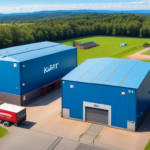Overview of the Global Packaging Industry
The global packaging industry continues to experience robust growth, projected to reach a market size of over $1.1 trillion by 2025, with a compound annual growth rate (CAGR) of approximately 3.5% from 2020 to 2025, according to Statista. Key drivers include the expansion of the e-commerce sector, population growth, and increased manufacturing activities.
Key Trends Driving Growth
- Sustainability: There is a heightened focus on eco-friendly packaging solutions, including biodegradable, compostable, and recyclable materials.
- Innovation in Materials: Advances in packaging materials are enhancing durability and functionality while reducing environmental impact.
- Customization: Increasing demand for personalized packaging to enhance consumer experience.
- Digital Integration: Incorporation of smart packaging technologies for better tracking and consumer engagement.
Company Profiles: DS Smith vs Smurfit Kappa
DS Smith: An Overview
Founded in 1940, DS Smith is a leading British packaging company operating in over 37 countries. The company is renowned for its innovative and sustainable packaging solutions, serving industries such as food and beverage, e-commerce, and industrial markets.
Smurfit Kappa: An Overview
Established in 1934, Smurfit Kappa is an Irish-based company with operations in more than 30 countries. It specializes in producing a wide range of paper-based packaging solutions, emphasizing sustainability and circular economy principles.
Market Share and Financial Performance
Market Share Comparison
As of 2023, Smurfit Kappa maintains a dominant position in the European packaging market with an estimated market share of 20%, while DS Smith holds approximately 12%. Smurfit Kappa's extensive global presence and diversified product portfolio contribute to its larger market share.
Financial Performance
In the fiscal year 2023, Smurfit Kappa reported revenues of €12 billion, reflecting a 6% year-over-year growth, and an EBITDA of €2 billion. DS Smith reported revenues of £7 billion, marking an 8% increase, with an EBITDA of £1 billion. Both companies have demonstrated resilient financial performance, underpinned by strategic investments in sustainability and innovation.
Source: Reuters, DS Smith Investors
Product Portfolio and Innovation
DS Smith's Product Offerings
DS Smith offers a comprehensive range of packaging solutions tailored for various industries, including:
- E-commerce Packaging: Customized solutions to enhance protection and branding for online retailers.
- Retail Packaging: Innovative designs that improve shelf appeal and consumer interaction.
- Industrial Packaging: Durable packaging for heavy-duty applications, ensuring product safety during transit.
Smurfit Kappa's Product Offerings
Smurfit Kappa boasts a diverse product portfolio, including:
- Paper-Based Bags: High-end, customizable bags for luxury brands.
- Corrugated Packaging: Sustainable and recyclable corrugated solutions for various industries.
- Luxury Containers: Premium packaging options designed to enhance product presentation.
Innovation in Packaging
Both companies invest significantly in research and development to drive innovation. DS Smith's Greencoat technology offers fully recyclable and biodegradable alternatives to traditional materials, while Smurfit Kappa is advancing smart packaging solutions incorporating RFID and QR codes for enhanced traceability.
Sustainability Initiatives
DS Smith's Sustainability Efforts
DS Smith is committed to reducing its environmental footprint by targeting a 30% reduction in CO2 emissions by 2030. Initiatives include:
- Renewable Energy Investments: Implementation of wind turbines and solar panels across manufacturing plants.
- Closed-Loop Recycling: Developing systems to recycle used packaging back into new products.
- Waste Reduction: Achieving a 13% reduction in landfill waste since 2015.
Smurfit Kappa's Sustainability Efforts
Smurfit Kappa aims to use 100% sustainably sourced materials and reduce CO2 emissions by 40% by 2030. Key initiatives include:
- Circular Economy Model: Reusing and recycling materials to minimize waste.
- Energy Efficiency: Investing in biomass and other alternative energy sources.
- Recycled Materials: Producing 90% of packaging from recycled or sustainably sourced materials.
These sustainability efforts not only reduce environmental impact but also enhance brand reputation and attract eco-conscious consumers.
Marketing Strategies and Key Partnerships
Marketing Approaches
DS Smith: Focuses on personalized marketing campaigns and loyalty programs to strengthen relationships with existing customers. Emphasizes its e-commerce and retail packaging solutions to improve customer experience.
Smurfit Kappa: Utilizes digital marketing strategies, including social media and targeted online advertising, to attract new customers. Emphasizes sustainability and innovation in its marketing messages.
Strategic Partnerships
Both companies leverage strategic partnerships to enhance their product offerings and sustainability initiatives:
- DS Smith: Partners with major retailers like Amazon and Asda to develop custom packaging solutions tailored for e-commerce operations.
- Smurfit Kappa: Collaborates with technology firms such as HP Inc. to create innovative packaging solutions across various industries.
These collaborations enable both companies to stay at the forefront of industry advancements and meet evolving customer demands.
Investment Opportunities and Risks
Growth Opportunities
The growing demand for sustainable and innovative packaging solutions presents significant opportunities for both DS Smith and Smurfit Kappa. Expansion into emerging markets and diversification of product portfolios further enhance their growth prospects.
Potential Risks
Despite strong growth potential, several risks could impact financial performance:
- Supply Chain Disruptions: Global supply chain issues may affect production and distribution.
- Economic Instability: Fluctuations in the global economy could reduce consumer spending and demand for packaging.
- Regulatory Changes: Stricter environmental regulations may increase compliance costs.
Investors should consider these factors when evaluating investment opportunities in these companies.
Future Outlook and Expert Opinions
Industry Growth Prospects
The packaging industry is expected to continue its upward trajectory, driven by the expansion of e-commerce, increasing consumer demand for sustainable packaging, and ongoing technological advancements. Innovations such as smart packaging and biodegradable materials are likely to shape the future landscape.
Expert Analysis
Industry experts suggest that DS Smith's strategic acquisitions and focus on e-commerce packaging position it well to close the market share gap with Smurfit Kappa. Meanwhile, Smurfit Kappa's diverse product range and robust sustainability initiatives provide a competitive advantage in attracting a broad customer base.
According to a report by McKinsey & Company, companies that prioritize sustainability and innovation are better equipped to navigate market challenges and capitalize on growth opportunities.
Conclusion: Which Packaging Company is Better Suited for Your Business Needs?
Both DS Smith and Smurfit Kappa offer exemplary packaging solutions with a strong emphasis on sustainability and innovation. The optimal choice depends on specific business requirements, including product type, budget, and sustainability goals. DS Smith may be preferable for businesses focusing on e-commerce and seeking personalized packaging solutions, while Smurfit Kappa offers a broader range of high-end and sustainable packaging options suitable for diverse industries.
We recommend conducting a thorough analysis of your business needs and consulting with each company's representatives to determine the best fit for your packaging requirements.




















